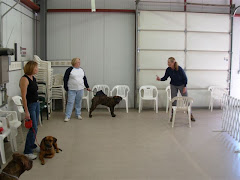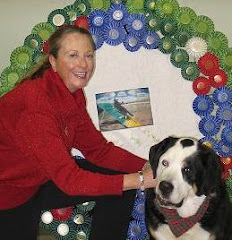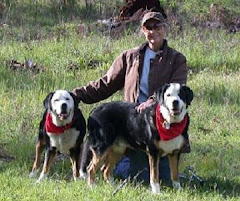What's the difference when it comes to modifying your dog's behavior?
To excuse is to put forward or defend an action in order to justify or minimize it.
- "He bites people because he was abused."
- "He won't listen to me because he's stubborn."
- "She's upset because the other dogs are distracting her."
- "She hides under the couch and growls because she is afraid."
To understand, however, is imperative to implementing change. When we understand a behavior, we recognize the true source of the problem and have a place from which to begin changing (improving) the behavior. Let's look at the above "excuses" again...what the owner is implying with the excuse, and why the the owner should learn to understand about the behavior:
1. "He bites people because he was abused." This suggests that the owner believes the dog's behavior may be permanent and justified. "Abuse" is a subjective, often overused, and emotionally charged term. Emotion clogs objective thinking and thus hinders pro-action. But what if the owner (or trainer) said, "He bites people because he has learned it gets him what he wants"? This statement is indisputable and unemotional. The dog bites because he discovered it's an effective defense (or offense). When we can clearly see why a dog has developed a habit, we can begin to identify how to re-program him.
Behavior: bites people
Excuse: abused (emotion-emoter)
Understanding: it's a defensive/offensive action that has worked for him in the past.
2. "He won't listen to me because he's stubborn." By branding him as stubborn, you remove your responsibility as the leader. You make an excuse for yourself, as well as for the dog. If you truly step down from the plate, you can be assured the situation will only get worse. The understanding should be this: he won't listen to you because he lacks adequate motivation to listen you. Your words are not important enough to him because you have now shown sufficient leadership. Learn to be a better leader and the dog will be much more biddable.
Behavior: won't listen
Excuse: stubborn (all his fault)
Understanding: lacks leadership
3. "She's upset because the other dogs are bothering her." The owner is excusing the behavior and passing the buck by blaming the other dogs. Many owners choose to simply remove their dogs from these difficult situations, but that will only reinforce the behavior. Indeed, the dog may be upset around the other dogs. But the reason isn't the other dogs; it's her lack of socialization, focus skills and leadership. By understanding, and not excusing, we have the tools to change her behavior.
Behavior: upset
Excuse: other dogs (passing the buck)
Understanding: lacks social skills and leadership
4. "She hides under the couch and growls because she is afraid." Here again, the owner excuses a behavior (hiding) by using an emotion-packed adjective that tugs at our heartstrings. The understanding: she has learned that she can escape various pressures by running away. She will continue to use this as a ploy to get out of anything unpleasant, unless you stop allowing her to run away from pressure. A simple drag leash is a great first step in changing such a behavior.
Behavior: hides
Excuse: afraid (emotion-emoter)
Understanding: she has learned to escape pressure by running away.
When our dogs have behavior problems, it's our responsibility as leaders to help them. Making excuses does not help our dogs. The kinder action is to understand, so you can them implement positive change.



















1 comment:
Making an excuse for poor behavior in a 2 or 4 footed child, is a very bad habit. This enables the behavior to continue and gives it purpose and strength. Over the last 72 hours my newly acquired mini-schnauzer has been transformed from a 'wild child' to a 'welcome companion'. I'm not saying she is perfect, but with Jan's suggestions, we are seeing drastic changes. Thanks again. mikesuz
Post a Comment